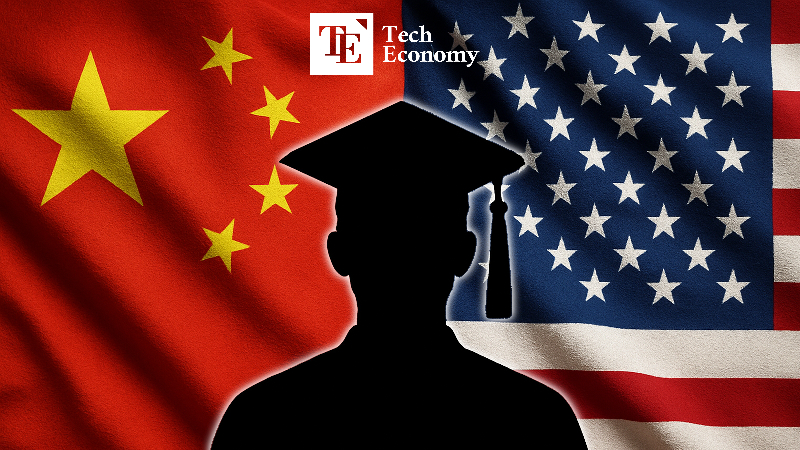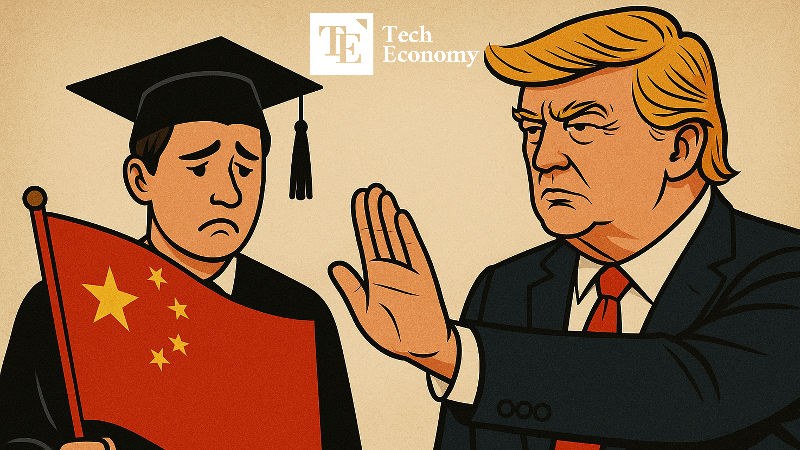"Student Visa Cancellations Are Political Discrimination" — China Strongly Protests Against U.S.
Input
Modified
U.S. State Department suggests possible cancellation of Chinese student visas China criticizes U.S. for "undermining its own national credibility" International students make significant contributions to the U.S. economy
The Chinese government has expressed strong regret over U.S. Secretary of State Marco Rubio’s remarks about canceling visas for Chinese students. What began as a trade conflict under former President Donald Trump’s tariff policies is now expanding into the domain of human and academic exchanges between the two countries.

U.S. and China Clash Over Student Visas
On the 29th (local time), Chinese Foreign Ministry spokesperson Mao Ning stated during a regular press briefing, “The U.S., under the pretext of ideology and national security, is unreasonably canceling visas for Chinese students. This severely infringes on the legitimate rights and interests of Chinese students and obstructs normal cultural and people-to-people exchanges between the two countries.” She added, “China firmly opposes this and has submitted a diplomatic protest to the U.S.”
Mao criticized the move, saying, “This act of political discrimination reveals that the so-called 'freedom and openness' consistently promoted by the U.S. is a lie. It only further damages the U.S.’s national image and credibility.” Regarding the broader implications for U.S.–China relations, she emphasized, “We hope the U.S. will face China directly and engage in constructive efforts to help foster the sound, stable, and sustainable development of China-U.S. relations.” She did not respond directly to questions about whether China is considering retaliatory measures.
The controversial comments came from a statement released by Secretary Rubio on the 28th titled, “The New Visa Policy Will Prioritize America Over China.” In the statement, he declared that under the leadership of former President Trump, he would cooperate with the Department of Homeland Security to actively revoke visas for Chinese students who are associated with the Chinese Communist Party or are conducting research in sensitive fields. He also announced plans to revise visa criteria to strengthen the screening of all future applications from China and Hong Kong. The implication was clear: Chinese students studying in the U.S. are being viewed as potential spies.
Chinese Students and Universities in Disarray
Rubio’s extreme remarks have caused visible distress among Chinese students currently studying in the United States. On the 28th, China’s state-run Global Times reported that many Chinese students are seriously considering transferring to universities in other countries to continue their studies. One Chinese student enrolled at Columbia University said in an interview with the outlet, “I felt anger and helplessness after hearing Rubio’s comments and couldn’t sleep. I’m overwhelmed by uncertainty about whether I’ll be able to complete my studies. The possibility that Rubio’s remarks could become reality has made my psychological state extremely complicated.”
U.S. academic institutions have also been deeply shaken. Michael Roth, President of Wesleyan University, criticized the move, saying, “Excluding Chinese students is a terrible decision and will have the opposite of the intended effect. It’s like shooting yourself in the foot.” Former U.S. Ambassador to China Gary Locke added, “The United States has always prospered by welcoming the world’s brightest minds. Excluding Chinese students not only runs counter to American values but also threatens our leadership in science, technology, and innovation.”

Is Excluding Chinese Students a Self-Defeating Move for the U.S.?
Negative reactions to Rubio’s statement are emerging not only in China but also within the United States itself. One major reason is that international students are a vital pillar of the American economy. According to a report released last year by the Association of International Educators (NAFSA), during the 2023–2024 academic year, there were 1,126,690 international students in the U.S. on F and M visas, accounting for 5.9% of the total student population. Among them, Chinese students made up 25%, second only to India’s 29%.
These students directly contribute to U.S. economic growth. NAFSA estimates that during the same academic year, international students generated approximately USD 43 billion in economic benefits for the U.S., including tuition, housing, and living expenses. Their spending is estimated to have supported 378,175 jobs across the country. Last month, the Washington Post reported, “In 2023, the U.S. exported more educational services globally than it did natural gas and coal combined,” highlighting the country's significant trade surplus in this sector.
Notably, more than half (51.9%) of Chinese students in the U.S. are majoring in STEM fields—science, technology, engineering, and mathematics—which are essential for technological innovation. International students with STEM degrees are known to play key roles in expanding the startup ecosystem in the U.S. A Stanford Graduate School of Business study examining 500 American unicorn companies (startups valued at over USD 1 billion) founded between 1997 and 2019 found that over half were founded by immigrants, many of whom originally came to the U.S. as international students. In this context, excluding Chinese students amounts to undermining a foundational engine of America’s industrial and economic growth.





















